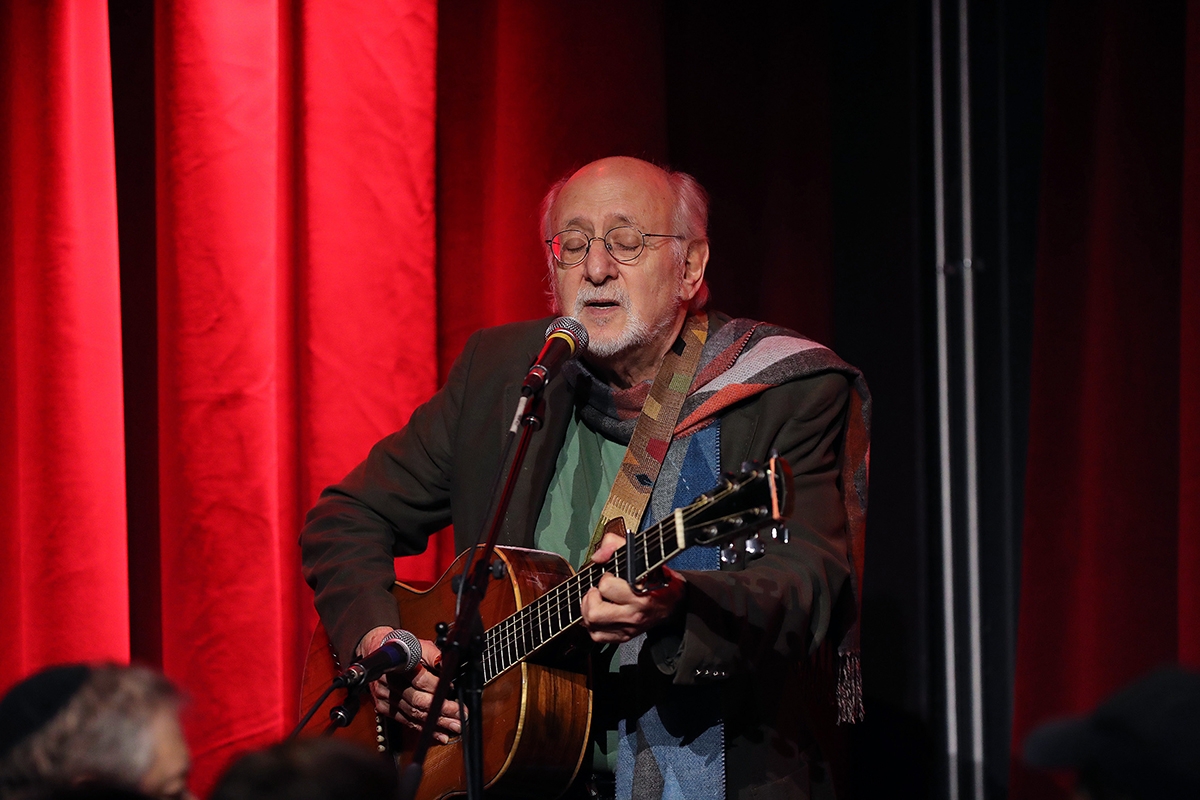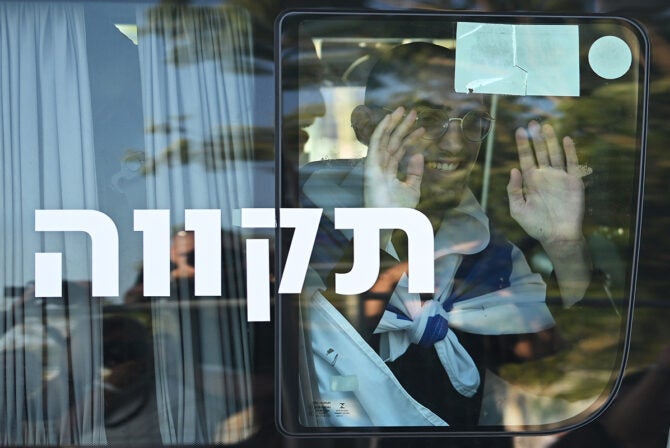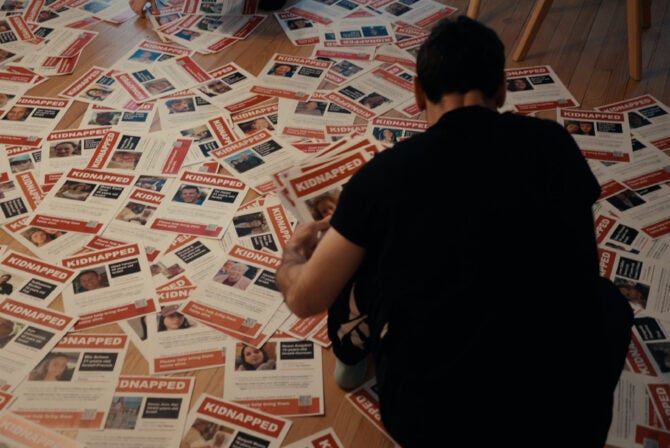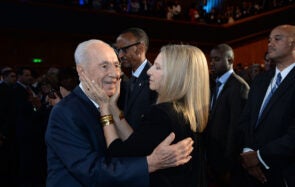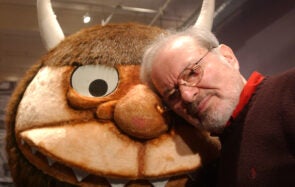In late 2023, Peter Yarrow and Noel “Paul” Stookey, two-thirds of the band Peter, Paul and Mary, took to the stage to sing “Don’t Let the Light Go Out,” a Hanukkah song inspired by the story of the Maccabees that Yarrow wrote in the wake of Israel’s first Lebanon War.
Hearing the duo sing about “the wisdom to know when the peacemakers’ time is at hand,” wishing for “the strength I need not to become my own foe,” sharing a plea to not let “anger tear us apart,” and urging us to “light one candle for those who are suffering, pain we learned so long ago,” felt especially timely in those days, just two months after the beginning of the ongoing Israel-Hamas War.
When Peter, Paul and Mary sang the song in a war-torn Israel in 1982, Mary Travers recalled that they didn’t want to sow more division, but to share their message of peace, knowing that many of those in the crowd had been directly affected by the price of war. “We didn’t want to be against anything specific, like Lebanon or the occupation, but for something — the moral ethic which is the essence of Israel.”
Being an activist was an important part of Peter Yarrow’s identity. The folk singer and songwriter, who died this week at age 86 after a four-year battle with bladder cancer and whose career was marred by a conviction of taking “indecent liberties” with a minor, was the son of Jewish Ukrainian immigrants. His parents divorced when he was 5 and he was raised by his mother in what he called a Jewish household, where “what was important was learning.”
“It was a Jewish family,” he told the Jewish Post. “There was money for education of every sort. There was money for music lessons, summer camp and for [my mother’s] children, but not for jewelry or Rolex watches. She never stopped working. She was really focused on things of great importance. This is where my value system arose and my commitment to being an activist was what she embraced.”
After graduating from Cornell University, Yarrow became part of the Greenwich Village folk music scene. It was his manager, Albert Grossman, who later went on to represent Bob Dylan, who had the idea for Peter, Paul and Mary. He imagined them as a group with folk sensibilities and mainstream appeal, which is indeed what they became. Grossman wanted to match Yarrow’s songwriting skills with the comedic and musical stage presence of Stookey, who at the time was performing standup in the village at the Gaslight (made famous again by “The Marvelous Mrs. Maisel”). Discovering folk musician Mary Travers, who had previously worked with Stookey, helped complete the trio. The band became an almost instantaneous hit in 1962 with their debut album “Peter, Paul and Mary,” which featured their original song “Lemon Tree” and their famous cover of the Pete Seeger song “”If I Had a Hammer,” rising to the top of the Billboard charts.
The group was famous for their activism, singing at anti-war rallies and even at the March on Washington where Martin Luther King made his famous speech and where they sang their moving cover of Dylan’s “Blowin’ in the Wind.”
One of the group’s most well-known original songs remains “Puff, the Magic Dragon” from their second album, “Moving.” The song features lyrics by Yarrow’s Cornell classmate Leonard Lipton — Lipton recalled that he typed them up in a typewriter in Yarrow’s college apartment. Lipton, who passed away in 2022, would go on to invent the technology we use to see and show 3D films, and he emphatically claimed the song was not about marijuana, as many fans extrapolated. Yarrow also denied the claim, saying that when he was in college, the most risque thing he and his friends did was drink the occasional beer.
“We didn’t have the option of writing a song about a dragon with a subtext about grass. I assure you that within six months I could’ve written such a song many times,” Yarrow joked in an interview.
Yarrow recalled singing the song at an anti-war protest at the 1968 democratic convention. “Underneath those helmets, the national guards and the police were these kids who weren’t going to fire at ‘Puff the Magic Dragon.'”
The song, Yarrow mused, “strikes a human chord of vulnerability.” It is in part about the melancholy of leaving childhood. “It’s a sad time when we grow but… if we keep our ethics and our values strong within us, our dragon will be safe and happy,” he once said.
The band split in 1970, in part because they longed to go their separate ways personally and artistically, but also in part because of accusations leveled against Yarrow for taking “improper liberties” with a 14-year-old fan. Yarrow admitted to the crime, and would end up spending three months in jail that year. Though he was pardoned by President Jimmy Carter in 1981, what he did would leave a dark shadow on his career and legacy until his death. Barbara Winter, the girl at the center of the case, said Carter’s pardon felt “like you got sucker-punched in the gut. It’s telling him, ‘It’s okay what you did, just don’t get caught next time,’ if that makes sense.” In 2021, the Washington Post shared that another woman had made allegations against Yarrow about an event from 1969, and that the singer settled the case.
“It was an era of real indiscretion and mistakes by categorically male performers. I was one of them. I got nailed. I was wrong. I’m sorry for it,” Yarrow said. When his performance at a New York festival was cancelled in the wake of the #MeToo movement in 2019, Yarrow did not fight the cancelation, calling the choice neither “unfair or unjust.”
“I do not seek to minimize or excuse what I have done and I cannot adequately express my apologies and sorrow for the pain and injury I have caused,” he shared in a statement to The New York Times.
Activism remained an important part of Yarrow’s life even after the break up of the group, and he was incredibly involved in peace activism in Israel. He was a member of the organization Peace Now. He co-founded Operation Respect, meant to foster tolerance in Arab and Jewish schools across the country. He collaborated with Israeli artists like David Broza, and in 2020, recorded the song “Think of Others” with a group of Jewish, Israeli and Palestinian artists.
Yarrow had two children with his wife, Mary Beth McCarthy (niece of Senator Eugene McCarthy), Christopher and Bethany. Later in his life, Yarrow performed with Bethany and cellist Rufus Cappadocia in a trio they dubbed Peter, Bethany and Rufus. In 1997, Peter and Bethany performed on stage with another great Jewish singer — Debbie Friedman. They sang “Day Is Done,” Peter, Paul and Mary’s last released song, which Yarrow wrote as an anti-war protest against the Vietnam War at the URJ Biennial RAC concert:
“To me, being Jewish and tikkun olam mean a sense of mission,” Yarrow shared in a 2017 interview. “I often see phrases I’ve written that are very Jewish. The idea that we turn suffering into love is a very Jewish idea. That’s how we survive and celebrate our spirituality. So I am really Jewish, not in the religious sense but in valuing the traditions and the commitment to the world and the ethical future of our children. It’s in my DNA and what makes me tick.”
May his memory be for a blessing.
